Mar 05, 2021 Disclaimer: this is in no way an authentic recipe for Mapo Tofu. This dish is inspired by few vegan versions of mapo tofu that I have tried in restaurants and also from this recipe . I have also made it in a way which is more suitable to my palate (less heat) so this is far from an authentic Sichuan version.
One of the main reasons I loved eating out was because you get to try so many new things when you eat out. Well, obviously that hasn’t been possible for the last one year and I terribly miss it. Sure we do take outs all the time but it’s just not the same. There also has been zero traveling and for me, traveling and food go hand in hand. In fact whenever we would plan our travels, we would first check all the cool restaurants in the area and then plan our days accordingly. It’s like our travel plans revolved around food. When we went to Paris, I literally searched for days on where to find the best croissants or gelato and pretty sure we went to each and every place. Oh how I miss travel and those adventures! Coming back to food though, I have always loved Asian cuisine. Unfortunately I have never travelled to any of these countries so my knowledge of the cuisine is pretty limited to what I have eaten in restaurants in the US. Tofu is commonly used in Asian recipes and Mapo tofu happens to be a popular recipe that’s often on the menu. It’s spicy, has so much flavor and I love it with some jasmine or brown rice.
What is Mapo Tofu?
It’s a famous dish from Sichuan region in China. This region is famous for it’s spicy food and mapo tofu is no exception. Traditionally mapo tofu is made with soft tofu and pork but of course I am sharing a vegan version where I replaced the meat with mushrooms. The main flavor of mapo tofu comes from it’s star ingredients like Sichuan peppercorns, spicy bean paste (more on these ingredients below). Sichuan peppercorns give this dish it’s characteristic numbing sensation. Since I can’t handle so much heat, I have modified the recipe a lot according to my taste and hence the disclaimer in the beginning.
Ingredients
Mapo Tofu recipe uses some specialty ingredients. These are not ingredients which you will like have at home until and unless you are Asian of course. I highly recommend getting these ingredients if you want to make more such recipe. You can find all these ingredients either at your local Asian grocery store or on amazon.
Tofu: whenever I cook tofu, I always pick the extra-firm variety. I am not a fan of soft tofu and extra-firm works better in Indian recipes so it’s always my choice of tofu. But for this mapo tofu, you need soft tofu or sliken tofu. Do not use extra-firm tofu for this recipe. One of the things that I learned while reading more about this recipe is that since the tofu is so soft here, you can actually heat it in water for few minutes and that helps firm it up a bit. This tofu is very soft so it breaks easily. I tried one batch without adding tofu to hot water and another batch with tofu in hot water for 4 to 5 minutes. I honestly did not find a very big difference but I thought the one which boiled in water for a bit was a little more firm. So, if you want you can definitely do this additional step. Mushrooms: the mushrooms replace the meat in this vegan version of mapo tofu. They have to be minced for this recipe or very finely chopped, I use my food chopper for this, works well. You can use whatever mushrooms you like but I prefer using shiitake mushrooms here. Sichuan peppercorns: if you have never tried this before let me tell you this is nothing like black peppercorns, not even remotely similar. It has a very floral aroma, and when you put it into your mouth, it has this tingling sensation and then some kind of metallic and numbing sensation afterwards. I can say this confidently that I have never had anything like this. It’s also very strong- a little goes a long way! While working on this recipe, I read about the origins of this dish and of course there’s no mapo tofu without Sichuan peppercorns. I added a lot of it in my first trial. I also crushed it and then added it- you guys my dish was just inedible. I had to throw it in the trash. I think it’s an acquired taste. If you are new to it, this might be a bit too much for your taste buds. I have drastically reduced the quantity of Sichuan peppercorns in this recipe. If you like the flavor, you can increase the amount to even 2 teaspoons. I used 1/2 teaspoon and even that I removed after sautéing in the oil. So, basically I sautéed the peppercorns in oil for few seconds to infuse the oil with it and then removed it from oil. This is just my way to make sure that the dish still has that slight taste from the peppercorns but it doesn’t actually overpower the dish. If you love it- you can use more of it. Sauté whole peppercorns and do not remove them from oil (like I did).Or you can dry roast them a little and then crush them using mortal and pestle and then use in the recipe. Crushing the peppercorns makes the flavor even more pronounced so keep this in mind. You can also use Sichuan peppercorn oil which is already infused with the flavors. Just to clarify again, I understand that is a very less amount of Sichuan peppercorns that I have added in the recipe and traditional recipes use so much more of it. But this is what worked for my tasted buds and you should feel free to adjust this amount to your taste and preference. I also think that maybe the peppercorns blend well with the meat but in the vegan version their taste becomes even more pronounced and hence the problem that I had when I added more of it. Fermented bean paste: I have used two kinds of fermented paste/sauce here- Gochujang: this is a spicy chili paste made with glutinous rice, fermented beans etc. This can be extremely spicy but the brand that I used was not very spicy. It has a strong flavor, it’s salty and also has some sweetness to it. Sure it’s spicy but it’s not extra-spicy. Different brands will have different spice levels. So make sure to taste test it before you use in the recipe. If the brand you are using is super spicy, then make sure to cut down on the amount of gochujang used in the recipe. Toban Djan (Chili Bean Sauce): this is a blend of chilies and fermented beans and works well in the recipe to create that depth of flavors. Again this isn’t very spicy but different brands will have difference spice levels. Flavorings: other than these main ingredients, the recipe also uses lots of ginger-garlic and soy sauce and sesame sauce for flavor. I also add little sugar to balance the flavors. What can I substitute for Sichuan peppercorns? Whole back peppercorns would be a substitute. Although the two peppercorns are very different in taste with Sichuan having a floral aroma and tingling taste. It’s definitely unique and hard to replace. Some also recommend using a combination of coriander seeds and black peppercorns. Substitute for fermented bean paste? Again, these should not be replaced because of the flavors they have. But hoisin sauce along with a hot sauce can be tried as a replacement. Substitute for mushrooms? I think lentils can be a substitute, maybe chana dal or soy granules can also be substituted. Is this vegan mapo tofu recipe gluten-free? No, the chili bean sauce has wheat in it. If you read the labels and make sure that the sauces are wheat-free, then the recipe will be gluten-free. Serving suggestions for mapo tofu? I love eating mine with jasmine white rice or brown rice. You can also serve a side of green beans, broccoli or a salad along with.
Method
1- This step is optional but firms up the soft tofu a little bit. So for this step, boil water in a large pot and then add cubes of tofu to warm water and let it be there for 4 tp 5 minutes and then remove tofu from water and set aside. You can skip this step. 2- To a skillet, heat 2 tablespoons oil (I used avocado oil) and 1 teaspoon chili oil on low-medium heat. Once hot, to that add Sichuan peppercorns. Sauté 1-2 minutes until oil has a nice smell from the peppercorns. 3- Turn off heat and then remove the pan from heat and then using kitchen tweezers remove the peppercorns from oil. Please note that if you prefer the flavor of these peppercorns, you can leave the peppercorns as such and there’s no need to remove then. You can also add more peppercorns if you want here. This is just what I preferred. 4- Put the pan back on heat and turn on the heat again to medium-low and add gochujang. Sauté the paste for 1 to 2 minutes in the oil.
5- Then add ginger-garlic along with chili bean sauce. Also add the mushrooms to the pan. Stir and increase the heat to medium. 6- Cook the mushrooms for around 6 minutes until they are caramelized. 7- Then add water and stir. 8- Add the soy sauce and mix.
9- Also add the sugar and salt and mix well. You can adjust the consistency at this point, if you prefer more sauce, add more water. Meanwhile in a small bowl mix 3 teaspoons cornstarch along with 2 tablespoons water. 10- Now add the prepared cornstarch slurry to the pan (stir before adding to make sure the cornstarch hasn’t settled down at the bottom). Stir and the sauce will thicken immediately. 11- Add the tofu and toss, be careful as the tofu is soft and might crumble so toss gently. Let it simmer 2 minutes. Then add sesame oil and turn off the heat. 12- Add chopped green onions on top.
Serve mapo tofu with more green onions with jasmine rice. If you like the flavor of Sichuan peppercorns, you can also crush some of it and sprinkle on top before serving (I did not do this).
More Asian Inspired Tofu Recipes
Asian Tofu Broccoli Stir-Fry Kung Pao Tofu Thai Basil Tofu Stir Fry If you’ve tried this Vegan Mapo Tofu Recipe then don’t forget to rate the recipe! You can also follow me on Facebook, Instagram to see what’s latest in my kitchen!
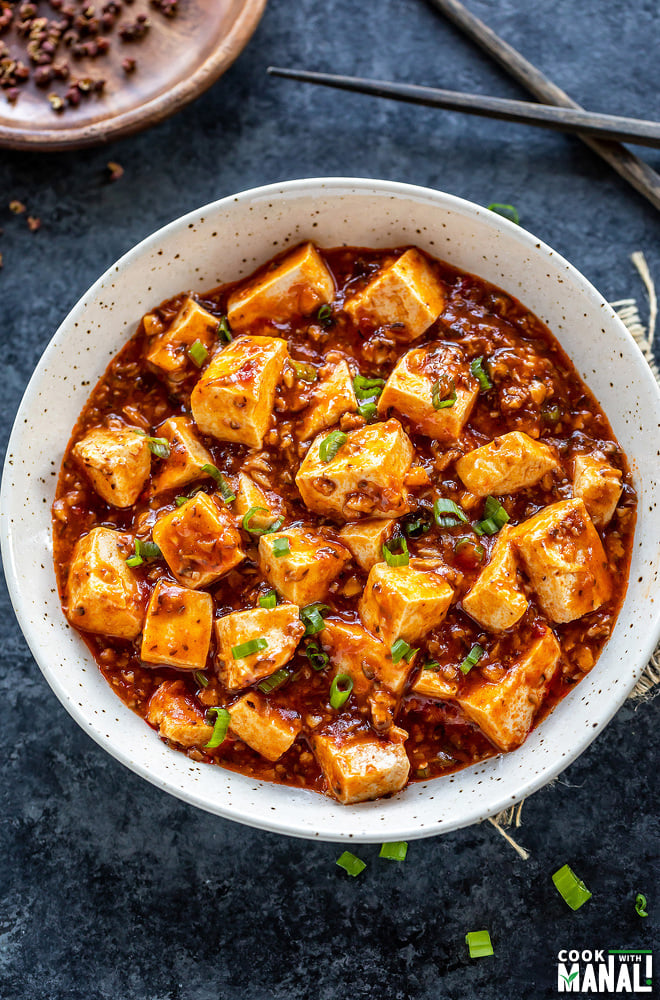
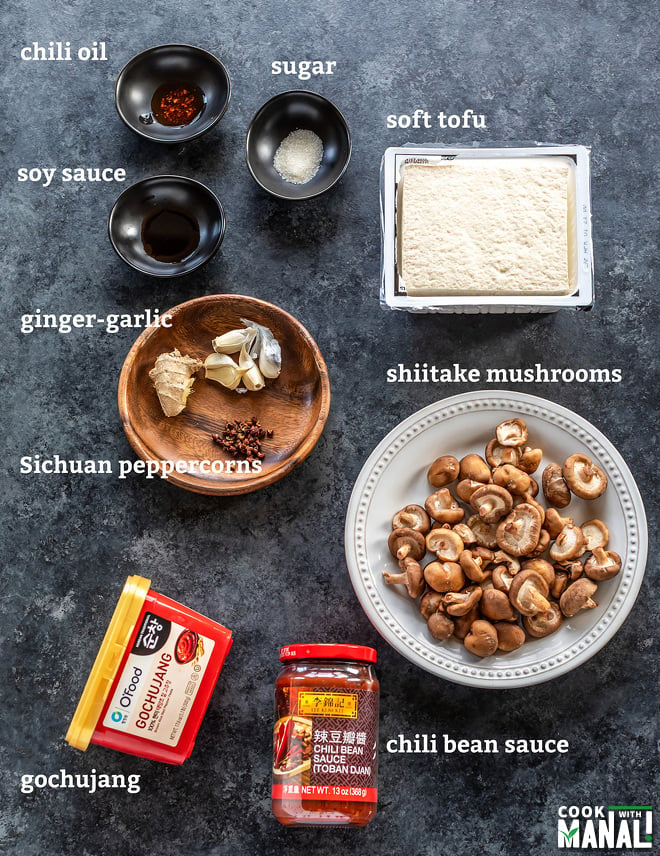
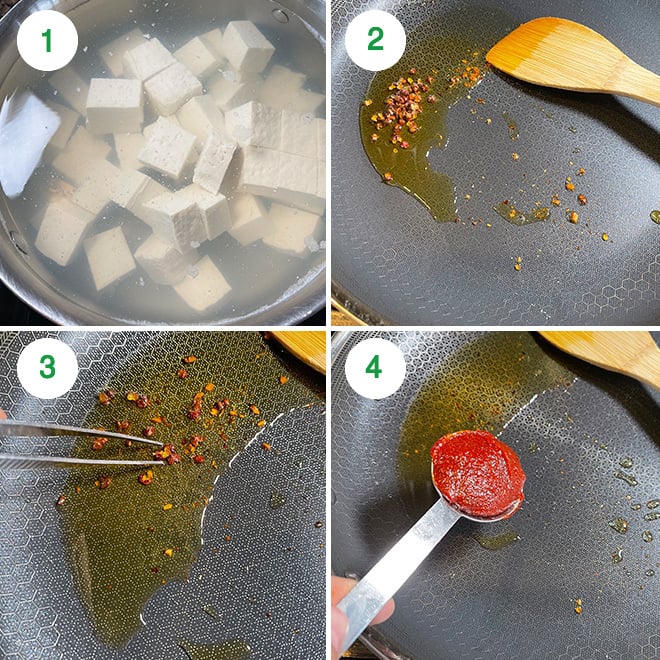
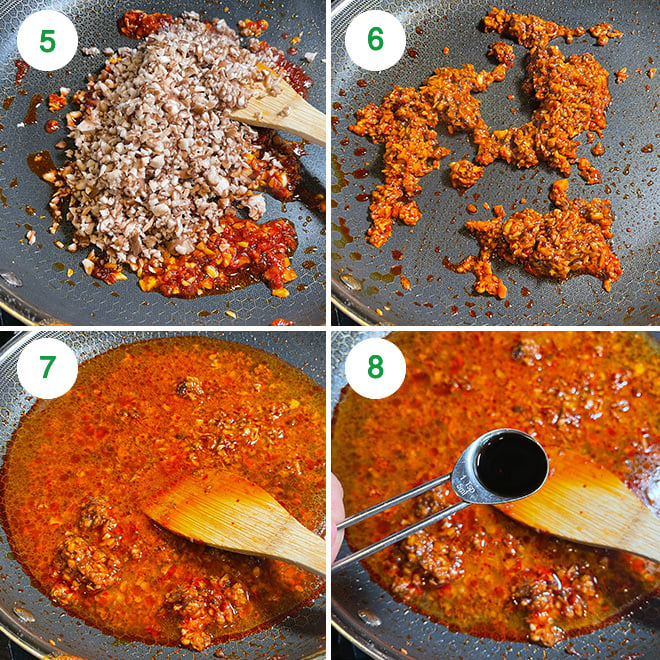
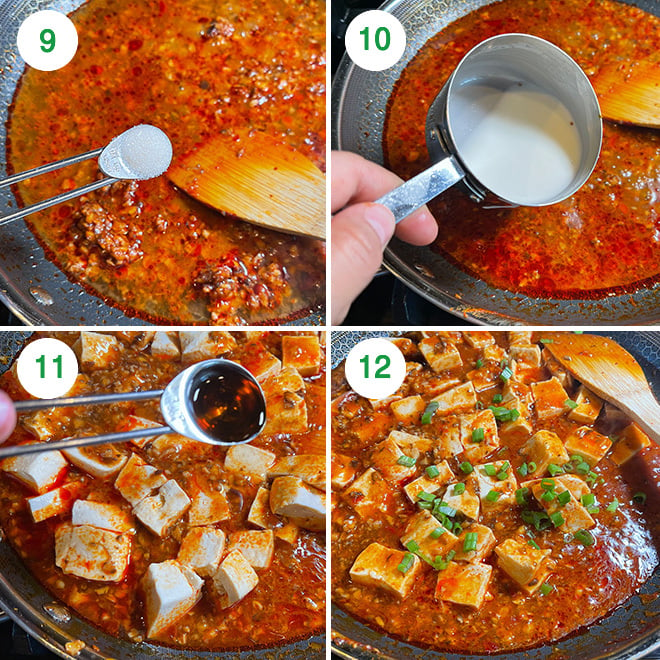
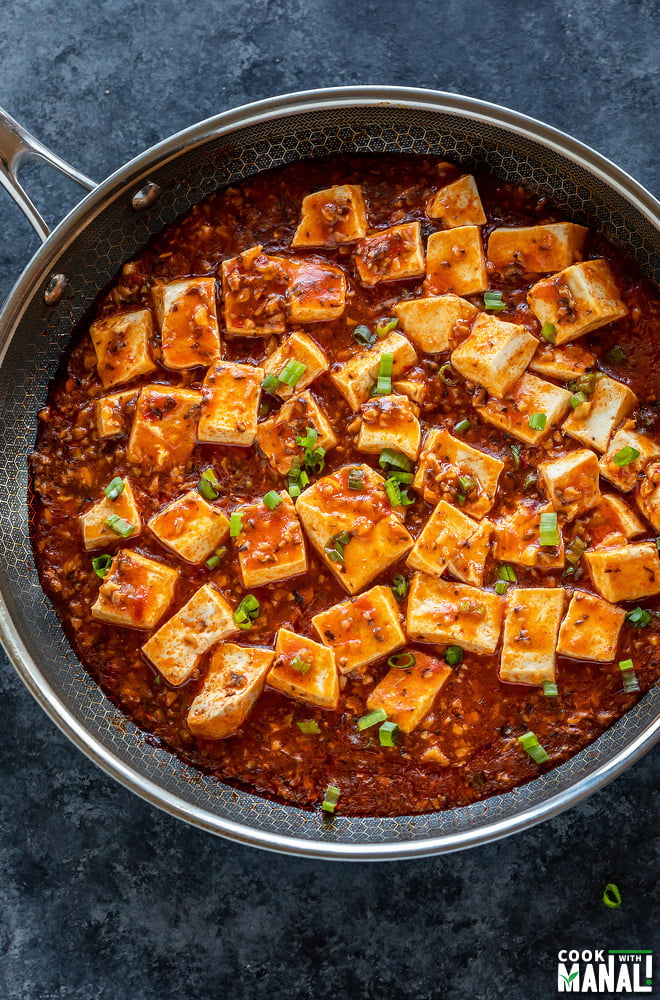
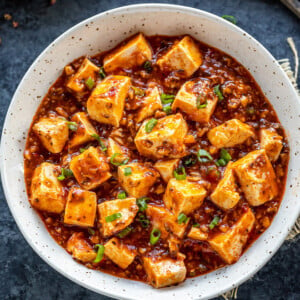
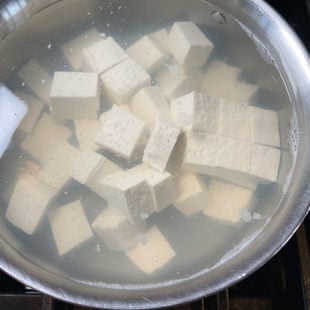
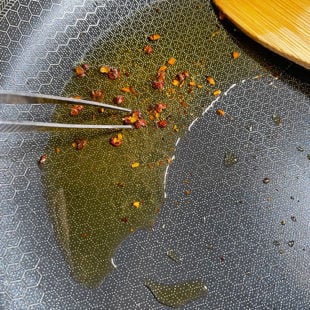
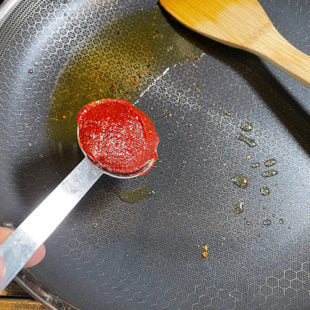
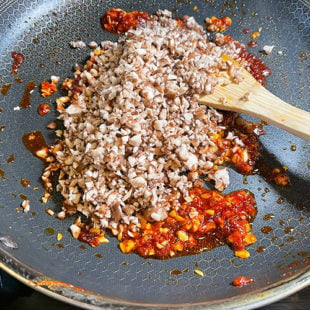
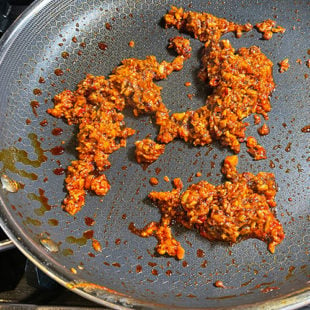
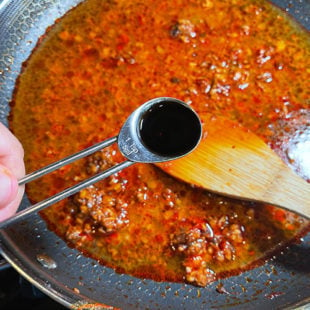
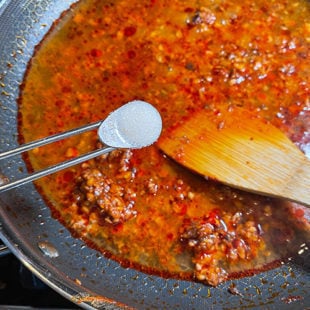
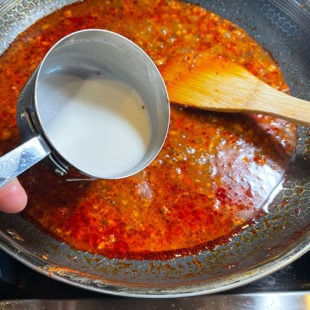
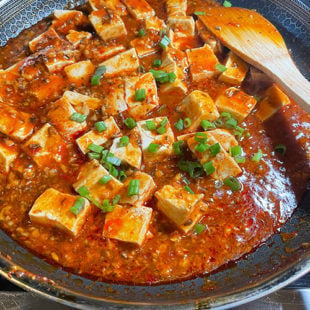
title: “Vegan Mapo Tofu " ShowToc: true date: “2024-10-19” author: “Clinton Allen”
Mar 05, 2021 Disclaimer: this is in no way an authentic recipe for Mapo Tofu. This dish is inspired by few vegan versions of mapo tofu that I have tried in restaurants and also from this recipe . I have also made it in a way which is more suitable to my palate (less heat) so this is far from an authentic Sichuan version.
One of the main reasons I loved eating out was because you get to try so many new things when you eat out. Well, obviously that hasn’t been possible for the last one year and I terribly miss it. Sure we do take outs all the time but it’s just not the same. There also has been zero traveling and for me, traveling and food go hand in hand. In fact whenever we would plan our travels, we would first check all the cool restaurants in the area and then plan our days accordingly. It’s like our travel plans revolved around food. When we went to Paris, I literally searched for days on where to find the best croissants or gelato and pretty sure we went to each and every place. Oh how I miss travel and those adventures! Coming back to food though, I have always loved Asian cuisine. Unfortunately I have never travelled to any of these countries so my knowledge of the cuisine is pretty limited to what I have eaten in restaurants in the US. Tofu is commonly used in Asian recipes and Mapo tofu happens to be a popular recipe that’s often on the menu. It’s spicy, has so much flavor and I love it with some jasmine or brown rice.
What is Mapo Tofu?
It’s a famous dish from Sichuan region in China. This region is famous for it’s spicy food and mapo tofu is no exception. Traditionally mapo tofu is made with soft tofu and pork but of course I am sharing a vegan version where I replaced the meat with mushrooms. The main flavor of mapo tofu comes from it’s star ingredients like Sichuan peppercorns, spicy bean paste (more on these ingredients below). Sichuan peppercorns give this dish it’s characteristic numbing sensation. Since I can’t handle so much heat, I have modified the recipe a lot according to my taste and hence the disclaimer in the beginning.
Ingredients
Mapo Tofu recipe uses some specialty ingredients. These are not ingredients which you will like have at home until and unless you are Asian of course. I highly recommend getting these ingredients if you want to make more such recipe. You can find all these ingredients either at your local Asian grocery store or on amazon.
Tofu: whenever I cook tofu, I always pick the extra-firm variety. I am not a fan of soft tofu and extra-firm works better in Indian recipes so it’s always my choice of tofu. But for this mapo tofu, you need soft tofu or sliken tofu. Do not use extra-firm tofu for this recipe. One of the things that I learned while reading more about this recipe is that since the tofu is so soft here, you can actually heat it in water for few minutes and that helps firm it up a bit. This tofu is very soft so it breaks easily. I tried one batch without adding tofu to hot water and another batch with tofu in hot water for 4 to 5 minutes. I honestly did not find a very big difference but I thought the one which boiled in water for a bit was a little more firm. So, if you want you can definitely do this additional step. Mushrooms: the mushrooms replace the meat in this vegan version of mapo tofu. They have to be minced for this recipe or very finely chopped, I use my food chopper for this, works well. You can use whatever mushrooms you like but I prefer using shiitake mushrooms here. Sichuan peppercorns: if you have never tried this before let me tell you this is nothing like black peppercorns, not even remotely similar. It has a very floral aroma, and when you put it into your mouth, it has this tingling sensation and then some kind of metallic and numbing sensation afterwards. I can say this confidently that I have never had anything like this. It’s also very strong- a little goes a long way! While working on this recipe, I read about the origins of this dish and of course there’s no mapo tofu without Sichuan peppercorns. I added a lot of it in my first trial. I also crushed it and then added it- you guys my dish was just inedible. I had to throw it in the trash. I think it’s an acquired taste. If you are new to it, this might be a bit too much for your taste buds. I have drastically reduced the quantity of Sichuan peppercorns in this recipe. If you like the flavor, you can increase the amount to even 2 teaspoons. I used 1/2 teaspoon and even that I removed after sautéing in the oil. So, basically I sautéed the peppercorns in oil for few seconds to infuse the oil with it and then removed it from oil. This is just my way to make sure that the dish still has that slight taste from the peppercorns but it doesn’t actually overpower the dish. If you love it- you can use more of it. Sauté whole peppercorns and do not remove them from oil (like I did).Or you can dry roast them a little and then crush them using mortal and pestle and then use in the recipe. Crushing the peppercorns makes the flavor even more pronounced so keep this in mind. You can also use Sichuan peppercorn oil which is already infused with the flavors. Just to clarify again, I understand that is a very less amount of Sichuan peppercorns that I have added in the recipe and traditional recipes use so much more of it. But this is what worked for my tasted buds and you should feel free to adjust this amount to your taste and preference. I also think that maybe the peppercorns blend well with the meat but in the vegan version their taste becomes even more pronounced and hence the problem that I had when I added more of it. Fermented bean paste: I have used two kinds of fermented paste/sauce here- Gochujang: this is a spicy chili paste made with glutinous rice, fermented beans etc. This can be extremely spicy but the brand that I used was not very spicy. It has a strong flavor, it’s salty and also has some sweetness to it. Sure it’s spicy but it’s not extra-spicy. Different brands will have different spice levels. So make sure to taste test it before you use in the recipe. If the brand you are using is super spicy, then make sure to cut down on the amount of gochujang used in the recipe. Toban Djan (Chili Bean Sauce): this is a blend of chilies and fermented beans and works well in the recipe to create that depth of flavors. Again this isn’t very spicy but different brands will have difference spice levels. Flavorings: other than these main ingredients, the recipe also uses lots of ginger-garlic and soy sauce and sesame sauce for flavor. I also add little sugar to balance the flavors. What can I substitute for Sichuan peppercorns? Whole back peppercorns would be a substitute. Although the two peppercorns are very different in taste with Sichuan having a floral aroma and tingling taste. It’s definitely unique and hard to replace. Some also recommend using a combination of coriander seeds and black peppercorns. Substitute for fermented bean paste? Again, these should not be replaced because of the flavors they have. But hoisin sauce along with a hot sauce can be tried as a replacement. Substitute for mushrooms? I think lentils can be a substitute, maybe chana dal or soy granules can also be substituted. Is this vegan mapo tofu recipe gluten-free? No, the chili bean sauce has wheat in it. If you read the labels and make sure that the sauces are wheat-free, then the recipe will be gluten-free. Serving suggestions for mapo tofu? I love eating mine with jasmine white rice or brown rice. You can also serve a side of green beans, broccoli or a salad along with.
Method
1- This step is optional but firms up the soft tofu a little bit. So for this step, boil water in a large pot and then add cubes of tofu to warm water and let it be there for 4 tp 5 minutes and then remove tofu from water and set aside. You can skip this step. 2- To a skillet, heat 2 tablespoons oil (I used avocado oil) and 1 teaspoon chili oil on low-medium heat. Once hot, to that add Sichuan peppercorns. Sauté 1-2 minutes until oil has a nice smell from the peppercorns. 3- Turn off heat and then remove the pan from heat and then using kitchen tweezers remove the peppercorns from oil. Please note that if you prefer the flavor of these peppercorns, you can leave the peppercorns as such and there’s no need to remove then. You can also add more peppercorns if you want here. This is just what I preferred. 4- Put the pan back on heat and turn on the heat again to medium-low and add gochujang. Sauté the paste for 1 to 2 minutes in the oil.
5- Then add ginger-garlic along with chili bean sauce. Also add the mushrooms to the pan. Stir and increase the heat to medium. 6- Cook the mushrooms for around 6 minutes until they are caramelized. 7- Then add water and stir. 8- Add the soy sauce and mix.
9- Also add the sugar and salt and mix well. You can adjust the consistency at this point, if you prefer more sauce, add more water. Meanwhile in a small bowl mix 3 teaspoons cornstarch along with 2 tablespoons water. 10- Now add the prepared cornstarch slurry to the pan (stir before adding to make sure the cornstarch hasn’t settled down at the bottom). Stir and the sauce will thicken immediately. 11- Add the tofu and toss, be careful as the tofu is soft and might crumble so toss gently. Let it simmer 2 minutes. Then add sesame oil and turn off the heat. 12- Add chopped green onions on top.
Serve mapo tofu with more green onions with jasmine rice. If you like the flavor of Sichuan peppercorns, you can also crush some of it and sprinkle on top before serving (I did not do this).
More Asian Inspired Tofu Recipes
Asian Tofu Broccoli Stir-Fry Kung Pao Tofu Thai Basil Tofu Stir Fry If you’ve tried this Vegan Mapo Tofu Recipe then don’t forget to rate the recipe! You can also follow me on Facebook, Instagram to see what’s latest in my kitchen!















